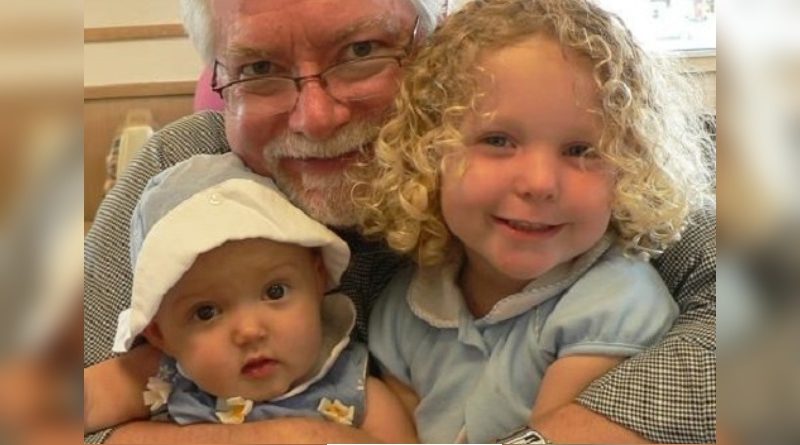Becoming like little children
I’m turning 63 today. Old enough to draw Social Security while it’s still around and young enough to enjoy life while I can still get around. So, I’m taking the day off and running an old newspaper column on the importance of being young at heart.
My wife would often roll her eyes and refer to pre-school Faith and Paul—and me—as her three children. Maybe it was our wrestling matches which involved pummeling each other with decorative couch pillows or all three of us making funny faces for family photos when Lois scolded us to “Be serious!” She probably had a point. Now that I’m a bit older—okay, a lot older—I can still act I like a 60-year-old preschooler. But I take comfort in the words of Jesus:
“So anyone who becomes as humble as this little child is the greatest in the Kingdom of Heaven” (Matthew 18:4).
There is, however, an adult-sized difference between being child-like and childish. The apostle Paul writes:
When I was a child, I spoke and thought and reasoned as a child. But when I grew up, I put away childish things (1 Corinthians 13:11).
I really have worked hard on knowing the difference and acting accordingly—most of the time. I still get the look from not only my wife but now from my children as well!
Child-like adults are trusting; childish adults, gullible
A sign at an old general store read, “In God we trust. All others pay cash.” We are taught to “trust in the Lord with all our heart” (Proverbs 3:5), but Jesus warns us to examine the “fruit” of those who claim to be His followers. Paul teaches “prove all things” and John warns to “test the spirits.” So, even though I admire the trust when children and grandchildren jump off furniture into my arms, I also want them to jump into the arms of trustworthy people.
Child-like adults are innocent; childish adults naïve
Jesus teaches us to be “gentle as doves, but wise as serpents.” Or, as the Chinese proverb warns, “Fool me once, your fault. Fool me twice, my fault.” I want to extend grace to everyone I meet, but as I was warned by hosts in Third World countries, I’m going to always keep my back to a wall.
Child-like adults are enthusiastic; childish adults, impulsive
I’m still learning to look before I leap, weigh options before acting, discern long-term consequences and be careful that my ADD doesn’t get the best of me.
Child-like adults are imaginative; childish adults, delusional
This explains the lottery, Internet scams and grandiose dreams that often turn into disastrous nightmares. The neurotic builds castles in the sky; the psychotic moves into them.
Child-like adults are creative; childish adults, destructive
Does our unique approach to life build up or tear down, lift up or put down? A college president for whom I wrote promotional material once called me “dangerously creative.” At the time, I viewed it as the highest compliment. Now, I’m trying to be “cautiously creative.”
And child-like adults are curious; childish adults, nosy
Nothing was more fun as a preschooler than rummaging through my grandmother’s purse. I’m not sure why. There was little in there of interest to a four-year-old boy. I still have that curiosity, but now I have to watch myself that I am being curious about life, rather than a voyeur, gossip, or scandal-monger.
Child-likeness is essential for being a trusting, innocent, imaginative, creative, and curious child of God. But we need to be careful that it doesn’t become immature childishness.
C. S. Lewis puts it this way: “[God] wants a child’s heart, but a grown-up’s head.”
Put away childishness? Yes! Put away child-likeness? Never!
Copyright © 2008 James N. Watkins
Related article from StudyFinds.org
Researchers from Healthspan, a supplier of vitamins and health supplements in the United Kingdom, polled 2,000 British adults on the effects of nostalgia and youthful behavior on mental and physical health.
Being silly gets tougher as we get older, but a new study finds that acting immature is actually good for your health and well-being, and a great way to start feeling younger.
Nearly three quarters of respondents indicated that occasionally forgetting you’re an adult and tapping into a more immature mindset — be it watching old cartoons, pulling pranks on friends, or playing classic board games — was important for their health.
In fact, one in four participants admitted they’d like to remain “child-like” for as long as possible, and half still felt cravings for childhood experiences.
“Perceiving ourselves as younger than our age is linked to a more future-orientated outlook, which means that we make better health choices such as engaging in exercise and healthy eating,” says psychologist Dr. Meg Arroll in a press release. “The findings of this survey support previous research that has shown nostalgia boosts our mood.”
If you enjoyed this post, please share it on your social networks. Thanks!


Happy Birthday, Jim! May Jesus, the Lover of All Children, fill your day with sights, sounds, smells, tastes, and hugs that delight you as they would a child of God.
Just a simple memory your post brought to the surface: my dad and brothers having a pillow fight in the living room. Of course, the reason for this fight standing out in the realm of awesome pillow fights is the crack, the crash, and the groans as one wayward pillow soared its way into the glass of my mother’s antique china cupboard. (We won’t mention the sounds my mother made!) Starting to scold the boys, Mom’s tirade ended when Dad owned up to piloting the flying pillow.
And there ends the story, but the memory, ah, the memory! Thank you, Jim.
Amen Amen Amen ! Truly inspired from the Holy Spirit! Love your blogs.